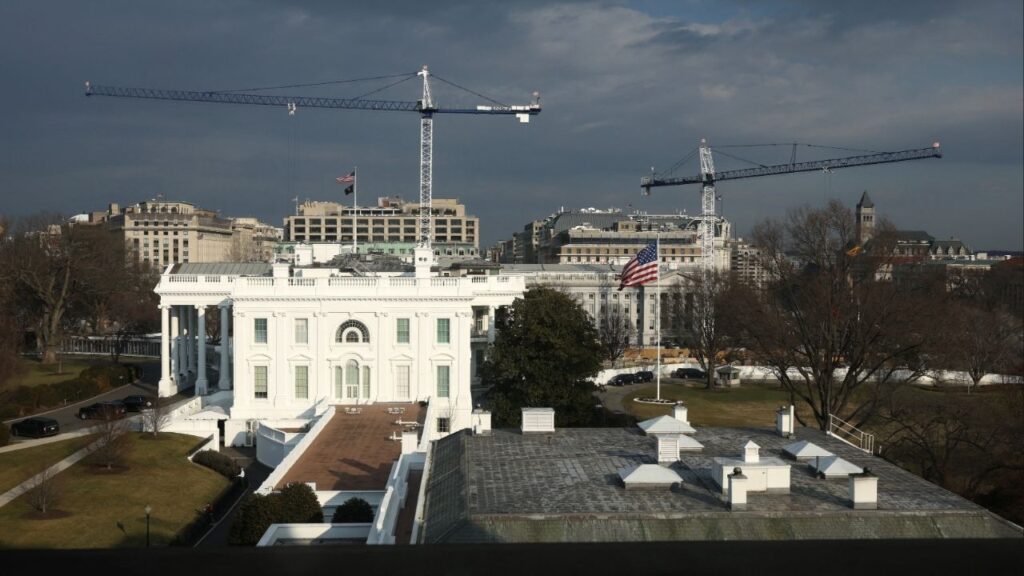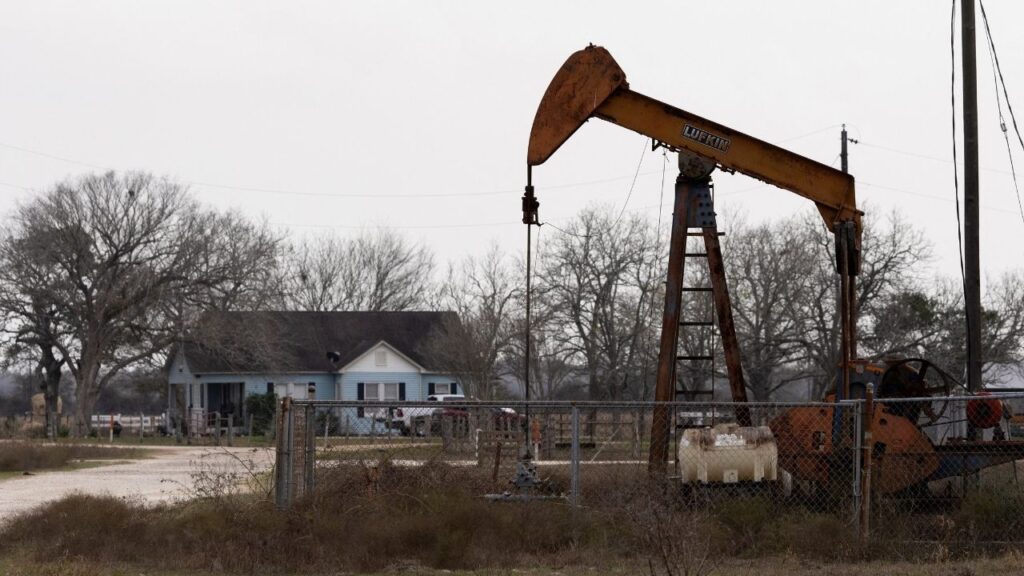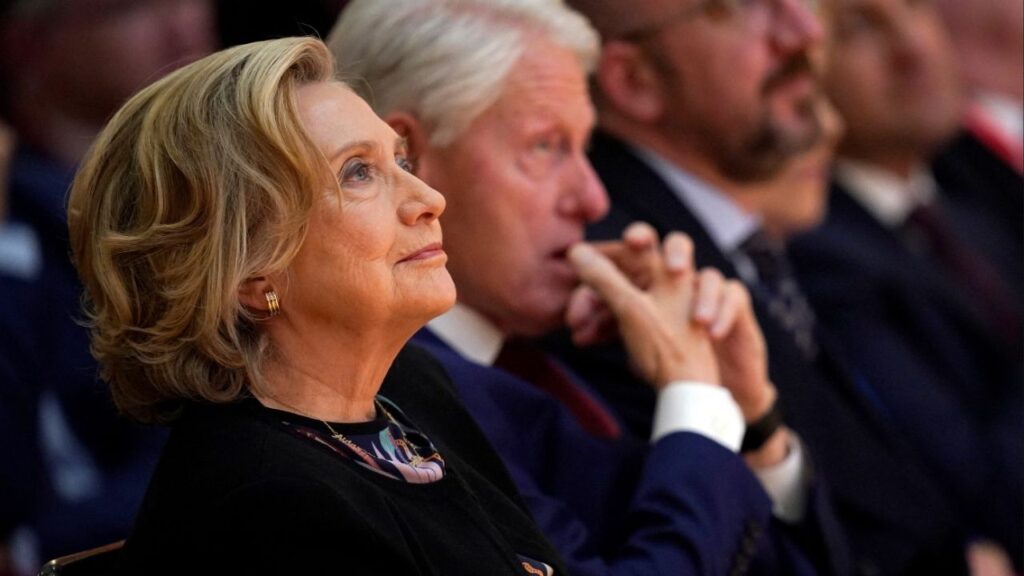In this photo released by the official website of the office of the Iranian supreme leader, Supreme Leader Ayatollah Ali Khamenei, third right, leads a prayer over the coffins of Hamas leader Ismail Haniyeh and his bodyguard who were killed in an assassination blamed on Israel on Wednesday, during their funeral ceremony at the Tehran University campus, in Tehran, Iran, Thursday, Aug. 1, 2024. Iranian President Masoud Pezeshkian prays at second right. (Office of the Iranian Supreme Leader via AP)
Share
|
Getting your Trinity Audio player ready...
|
In the turbulent landscape of the Middle East, Iran’s aging supreme leader, Ayatollah Ali Khamenei, could always rely on the close alliance, unwavering loyalty and deep friendship of Hassan Nasrallah, the leader of the Lebanese militia Hezbollah.
When Israel killed Nasrallah in a massive airstrike Friday, it abruptly wiped out a singular force in Khamenei’s hierarchy of close associates.
Related Story: Iran Believes All Remaining Workers Have Died in Coal Mine Explosion, Raising ...
Hezbollah as The Main Arm of Proxy Network for Iran
Iran had for 40 years nurtured Hezbollah as the main arm of its proxy network of militias, as a forward defense against Israel. But in the past two weeks, Hezbollah’s capacity began to crumble under wave after wave of Israeli attacks on its leadership, arsenal and communications.
Now, fissures have opened within the Iranian government over how to respond to Nasrallah’s killing, with conservatives arguing for a forceful response and the moderates, led by Iran’s new president, Masoud Pezeshkian, calling for restraint.
All of this has left Iran, and its supreme leader, in a vulnerable position.
Related Story: Israel-Hezbollah Tensions Spiral in Week of Attacks: What to Know
Four Iranian officials who knew Nasrallah personally and had been briefed on events said that Khamenei had been deeply shaken by his friend’s death and was in mourning, but had assumed a calm and pragmatic posture. The officials, including two members of the Revolutionary Guard, requested anonymity as they were not authorized to speak publicly.
Khamenei struck much the same tone in public. Instead of lashing out at Israel, he issued two restrained statements, praising Nasrallah as a leading figure in the Muslim world and the so-called axis of resistance, and saying that Iran would stand by Hezbollah.
Significantly, Khamenei signaled that it would be Hezbollah, not Iran, that would be leading any response to Israel, and that Iran would play a supporting role. “All of the forces in the resistance stand by Hezbollah,” Khamenei said. “It will be Hezbollah, at the helm of the resistance forces, that will determine the fate of the region.”
Analyst Shocked by No Seeable Response From Iran
It was a striking sign, some analysts said, that Khamenei may have no way to effectively respond at the moment to Israel’s onslaught on his proxies. Faced with a choice between all-out war with Israel or lying low in the interest of self-preservation, he appears to be choosing the latter.
“They are completely checkmated by Israel at this moment,” said Sanam Vakil, the director for Middle East at Chatham House. “Khamenei’s statement is indicative of the gravity of the moment and the caution; he is not publicly committing to anything that he can’t deliver.”
After Khamenei’s statements, a flurry of reactions from senior Iranian officials and military commanders had the same cautious tone, outsourcing revenge to other militia groups in the region. Gen. Hossein Salami, the commander in chief of the Revolutionary Guard, said that it would be “Hezbollah, Hamas and other Palestinian militants” that would deliver blows to Israel.
Related Story: ‘Deep Doubt’ Era: How AI Fakes Empower Liars and Conspiracy ...
In Tehran, Iran’s capital, the news of Nasrallah’s death cast a pall of shock and anxiety over senior officials who wondered in private phone calls and during emergency meetings if Israel would strike Iran next, and if Khamenei would be its next target, the four Iranian officials said in telephone interviews.
“This was an incredibly heavy blow, and realistically speaking, we have no clear path for recovering from this loss,” Mohammad Ali Abtahi, a former vice president of Iran, said in an interview from Tehran on Saturday. “We will not go to war, that’s off the table. But Iran will also not reverse course in supporting the militant groups in the region, nor in defusing tensions with the West. All of these things can be pursued at the same time.”
Abtahi said the collective feeling among Iranian officials was one of “shock, anger, sadness and a lot of anxiety.”
Pezeshkian: Lay Down Arms if Israel Laid Down Theirs
In New York, Pezeshkian told reporters that Iran was ready to “lay down its arms if Israel laid down its arms,” and called for an international force to intervene in establishing peace in the Middle East.
Pezeshkian has had to contend with two major crises during his two months in office: the Israeli assassination of the Hamas political leader, Ismail Haniyeh, in Tehran on the night of his inauguration and Nasrallah’s killing on the eve of his birthday.
Those crises made him an easy target among conservatives in Iran who criticized his conciliatory message in New York, saying it showed weakness and emboldened Israel to kill Nasrallah. The conservatives argued Iran should deploy fighters to Lebanon, as it did for the Syrian government in its civil war, to help Hezbollah in the event of an all-out war with Israel.
Related Story: Iran Believes All Remaining Workers Have Died in Coal Mine Explosion, Raising ...
“Israel has attacked the nucleus cell of the resistance and thus we cannot be indifferent,” said a conservative cleric, Ayatollah Mohammad Hassan Akhtari, the head of Iran’s Committee to Support Palestinians and the former head of international relations in Khamenei’s office.
Two members of the Revolutionary Guard — including a strategist who had been in planning meetings for the past two days on how Iran should respond — said in interviews that Iran’s immediate priority was to help Hezbollah get back on its feet, name a successor to Nasrallah, line up a new command structure and rebuild a safe communications network. Then, Hezbollah could plan its retaliation against Israel, they said.
–
This article originally appeared in The New York Times.
By Farnaz Fassihi
c. 2024 The New York Times Company
RELATED TOPICS:
Categories

Why Are So Many Democrats Running for California Governor?

Trump’s White House Ballroom Can Move Ahead for Now, Judge Rules

















